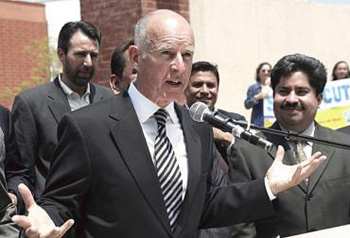For decades, capital punishment was a driving force in California politics, swaying elections for governor and the U.S. Senate and reshaping the state Supreme Court.

Jerry Brown (Nick Ut / AP)
While executions in California have been on hold for more than four years, tied up in court challenges to lethal injection procedures that the state is now redrafting, November's elections may determine whether the death penalty still carries political weight.
The contrasts at the top of the major parties' tickets could not be starker.
Democrats Jerry Brown and Kamala Harris, the candidates for governor and attorney general, oppose capital punishment and have acted on their beliefs - Brown by vetoing a death penalty bill when he was governor in 1977, Harris by refusing to seek death sentences as San Francisco district attorney.
Their Republican opponents, Meg Whitman and Steve Cooley, support capital punishment. So do most Californians, according to Field Poll surveys going back half a century, although the majority has fallen from 83 percent in 1986 to 67 percent in 2006.
An issue for Brown
Brown has tried to keep the issue at bay since 1977, when legislators overrode his veto and reinstated capital punishment. He was re-elected a year later while voters were also approving an initiative broadening the death penalty law.
While the sponsor of the 1977 law, then-state Sen. George Deukmejian, was being elected governor in 1982, Brown ran unsuccessfully for the U.S. Senate, a campaign in which Republican Pete Wilson hammered him for appointing state Supreme Court justices who overturned death sentences.
Four years later, voters unseated three of Brown's appointees, Chief Justice Rose Bird and Justices Cruz Reynoso and Joseph Grodin, an unprecedented action that swung the court's majority from liberal to conservative overnight.
Brown fended off attacks on his death penalty stance in his successful campaign for attorney general in 2006, saying he would follow the law. He's taken the same position in his run for governor.
"He's made it very clear throughout his career of public service that he's committed to upholding the laws of this state," including the death penalty, said campaign spokesman Sterling Clifford. He noted that lawyers from Brown's office have defended death sentences and the state's lethal injection procedures.
Saving prisoners
If executions resume, the next governor will have to rule on condemned prisoners' requests to commute their death sentences to life without parole. Clifford said Brown, who never had to face a clemency request in his previous terms as governor, would not issue blanket commutations and would consider each case individually.
Whitman, Brown's November opponent, hasn't said much more on the subject than the attorney general has.
Spokeswoman Sarah Pompei referred a reporter to Whitman's campaign brochure, which states: "Meg believes that the death penalty is warranted in limited cases involving the most heinous criminals. She will oppose any attempt to weaken California's death penalty law."
Pompei declined to elaborate.
The governor has considerable influence on the death penalty system, through decisions on clemency, judicial appointments, and legislative and budget actions.
For example, a state commission's 2008 report recommended spending $95 million on lawyers and staff to reduce the nation's longest delays in resolving Death Row cases, now about 20 years. Gov. Arnold Schwarzenegger and the Legislature shelved the report, but the next governor could revive it.
Attorney general's race
The attorney general, on the other hand, provides foot soldiers for day-to-day courtroom battles over convictions and sentences but has little power over death penalty policy. That hasn't stopped Cooley, the Los Angeles County district attorney, from attacking Harris, his Democratic opponent, for her unwillingness to seek death sentences even in cop-killing cases.
"She's substituting a political agenda for the exercise of law," said Kevin Spillane, a Cooley campaign consultant. "The death penalty is going to be a major point of contrast between Harris and Cooley."
While death sentences have declined nationwide, Spillane said, Cooley obtained 13 death verdicts last year, four more than the entire state of Texas.
Cooley would bring a new "energy, enthusiasm, commitment and focus" to capital punishment and would do everything he could to speed up executions, Spillane said.
A history of opposition
It's an issue that Harris, like Brown, isn't eager to discuss.
"She personally opposes the death penalty but will enforce the law," said her campaign consultant Ace Smith. He noted that four of the last nine attorneys general - Brown; his father, Pat Brown, who later became governor; and fellow Democrats Stanley Mosk and John Van de Kamp - all opposed capital punishment.
Smith declined to discuss Harris' record and said Cooley was making a "wild, reckless political attack." The death penalty, Smith said, is "one of about a thousand issues that's relevant" to the campaign.
That's what another Democratic hopeful thought 20 years ago. Van de Kamp, then the attorney general, was the early front-runner in his party's race for governor before his opponent, former San Francisco Mayor Dianne Feinstein, started emphasizing her support for the death penalty and Van de Kamp's opposition.
One of Feinstein's ads showed her being booed at the state Democratic convention after staking out her position on capital punishment, a speech her campaign strategically filmed. Feinstein proceeded to trounce Van de Kamp in the primary, then lost to Wilson in November 1990. She was elected to the Senate two years later.
Van de Kamp, who later chaired the state commission that issued the 2008 death penalty report, doesn't think the issue cost him a shot at the governorship. Feinstein beat him, he said, because "she was a better campaigner" and "it was a time for women to get elected."
But he said voters are entitled to know where candidates stand on the death penalty - how they will enforce it, and whether they will seek to expand, narrow or abolish it.
By rights, he said, this is "a backwater issue. But it's such an emotional issue."











